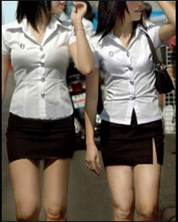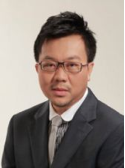The university uniform drama has unfolded a new ugly reality in Thai society. Recently, a vocal Thammasat student, under her chic nickname Aum Neko, has daringly defied a traditional practice of student uniform wearing within the walls of a prestigious university. As it is understood, there is no fixed rule on the necessity of wearing university uniform. However, some professors at Thammasat University have prescribed their own regulation in dictating students to wear uniform when attending their classes.
Aum Neko was right in raising this pertinent issue. The point here is not so much about the abolition of a forced uniform, but to open the door for all students to choose if they wish to wear university uniform. In other words, those who are keen to wear it, please do so. For those who are not, they are free to wear anything as long as it is decent.
But Aum Neko’s call for this kind of liberation strikes a raw nerve at the core of the Thai society. For a long time, student life within the Thai universities has never been “liberal”. This goes against a fundamental belief elsewhere that university students are mature enough to decide for themselves what are best for them. After all, they already possess their electoral right. Why can they not be allowed to enjoy the same right on something deemed to be so trivial, like wearing a university uniform?
Sexy student uniform
But in looking deeply, one will finds that the debate on university uniform is indeed not trivial. As I mentioned at the beginning, Aum Neko’s campaign to be liberated from a university uniform has shaken the foundation of Thai conservatism. University uniform is like a prison that has not only caged your imagination, but also compelled students to think and act in conformity. Such practice reflects the deep-rooted hierarchy in the social structure that has long prevailed in Thailand.
All Thais have succumbed to some kind of hierarchical confinements. Classes in Thailand have become a part of the people’s identity. For the elite, knowing one’s place in society and his/her anticipated role will help maintain societal order. It also helps prevent challenges, thus making the society more peaceful and predictable. Uniform represents obedience, loyalty and subservience. When applying this rule to students, university authorities and professors suddenly feel their overwhelming power.
It is scary to witness some conservative students who came out to strongly condemn Aum Neko for her supposedly rebellious attitude. A male Thammasat student hit back at Aum Neko, asking her to quit the university if she fails to comply with the dress code. “You must respect the place and the university. If you could not fulfil this obligation, you should leave”, he said.
“Leaving the country” has become an authoritative discourse designed to underpin a series of conventional thoughts which, this day, have continued to be challenged by new social forces. But the blame must not be placed on the male student. Indeed, the entire educational system must be seriously scrutinised.
In The Times Higher Education World University Rankings 2013, there is only one Thai university which has managed to get into the list. King Mongkut’s Technology University, Thonburi, is placed in the 351-400 rankings (in the top 40o). Thus, while much discussion has been on whether students should wear university uniform, the real focus on developing the quality of teaching and research within Thai universities is often ignored. The urge from the conservatives to maintain student uniform cannot be translated into a factor used to boost the excellent status of Thai universities in the scholarly world.
In retaliation, the conservatives have gone further by launching their own campaign to call for Thai companies and businesses not to hire Thammasat graduates if Thammasat refused to kick Aum Neko out of the university. It is thus assumed that only students who wear uniform could be considered as “good students” and who deserve their place in Thammasat University. The retaliation perfectly echoes the current crisis facing this society—the crisis that reveals the desperation on the part of the conservatives in upholding the social status quo in the face of changing societal environment.
Today, the society has changed its form and shape rapidly. This is because of the effects brought about by political and economic changes in Thailand. When those underprivileged are calling for the shift of the status quo and a fairer distribution of the nation’s political power and wealth, they are also fighting to break themselves free from a mould that has long imprisoned their thinking and behaviour.
The debate within Thammasat University on student uniform, on the one hand, reminds many of why the Thai education has gone wrong and why it is necessary for the traditionalists to protect their space in this fast changing society. On the other hand, it also reaffirms the fact that, perhaps, all debates, like this one, can further promote democratisation. Members of society are now testing each other’s patience for ultimately the respect for diversity in thoughts and differences in opinion.
And even if Aum Neko might become the loser in this risky game, she must be proud that at least she is entitled to put her bold message across.
Pavin Chachavalpongpun is associate professor at Kyoto University’s Centre for Southeast Asian Studies


